*content warning* please be advised this article contains discussion of trauma, excessive alcohol consumption, triggers and flashbacks and recommendation of deep internal work that may bring up some buried emotions and memories. please read at your own discretion.
before you read this article i would like to make it extremely clear that healing, and more specifically trauma healing, is different for everyone.
the information and strategies provided in this article are purely from my own experience and what helped me personally.
you are not alone – this is a survivors story for you to be inspired to try new strategies until you find what works best in your healing journey.
– the mind is incredible. you can achieve so much when you believe in yourself.
initial response
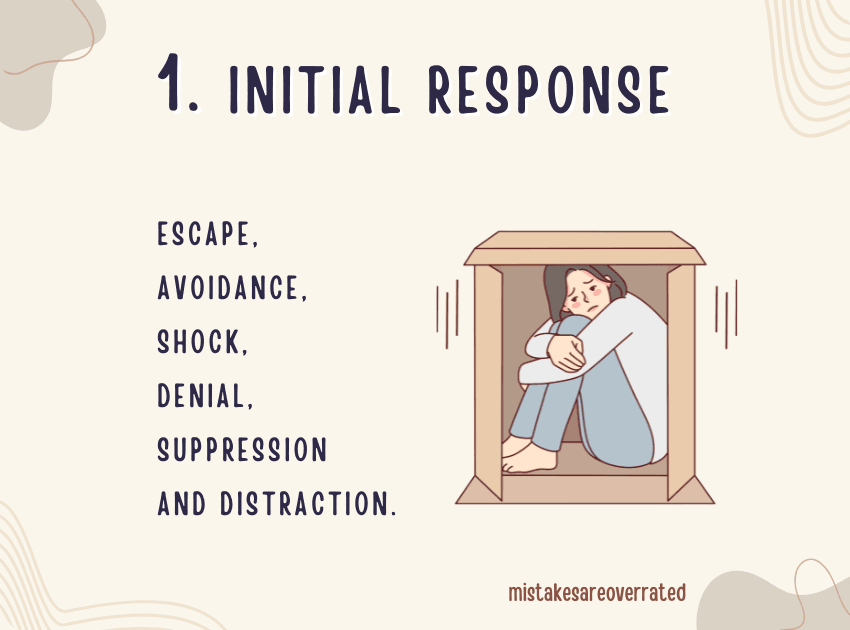
straight after i experienced the assault, my first stage began.
i was in a state of shock and disbelief of what i went through.
this stage involved escaping, numbing, avoiding and disconnecting from the reality of the trauma.
i escaped confronting the event and i suppressed my emotions, thoughts and feelings, as i didn’t know how to process its impact.
this was by far the most ‘unhealthy’ stage i went through during my trauma healing.
this stage lasted around 4 weeks.
(i didn’t have a single clue i was in “stages” in the moment of time. infact i thought i was acting normal – i only know now because of deep self reflection)
within this stage:
escape, avoidance, shock, denial, suppression and distraction.
strategies to navigate this stage:
seeking support
i know how scary it can be to reach out to anyone after experiencing trauma, but it can be so powerful whilst in this stage.
reaching out to trusted friends, family, or a mental health professional can help you by listening and offering you comfort.
this is extremely important as this can help you acknowledge what you went through.
the strongest point of this stage (for me), was trying to push away what happened and act like it didn’t even happen as i was in a state of shock.
but to achieve this mindset of ‘it didn’t happen’ i didn’t talk to anyone – suppressed all my emotions and thoughts
i avoided my trauma by using distractions – escaping the effects by constantly staying busy, staying out late and drinking alcohol to forget.
*please reach out for professional help if you’re engaging in excessive alcohol consumption.*
allow space for emotion
one thing that is very important is – please do not rush yourself to “move on” or ignore your feelings in any way.
allow yourself to fully feel and experience whatever it is that arises within you, without any judgment.
a big tip that i didn’t do for myself, but would of helped immensely is:
give yourself permission during this stage.
permission to feel your emotions, permission to grieve what you went through, permission to tell someone what happened, permission to take time off for yourself to process the experience/s.
grounding techniques
grounding techniques can be extremely powerful during this stage, especially when trying to fall asleep or when you get a flashback.
i experienced severe flashbacks during this stage and really struggled to fall asleep and stay asleep.
practice mindfulness, grounding exercises, have an physical object or sensory techniques to help you reconnect with the present moment.
if you’re experiencing troubles falling asleep, i have in in-depth article on – how to quiet your mind after trauma.
masking
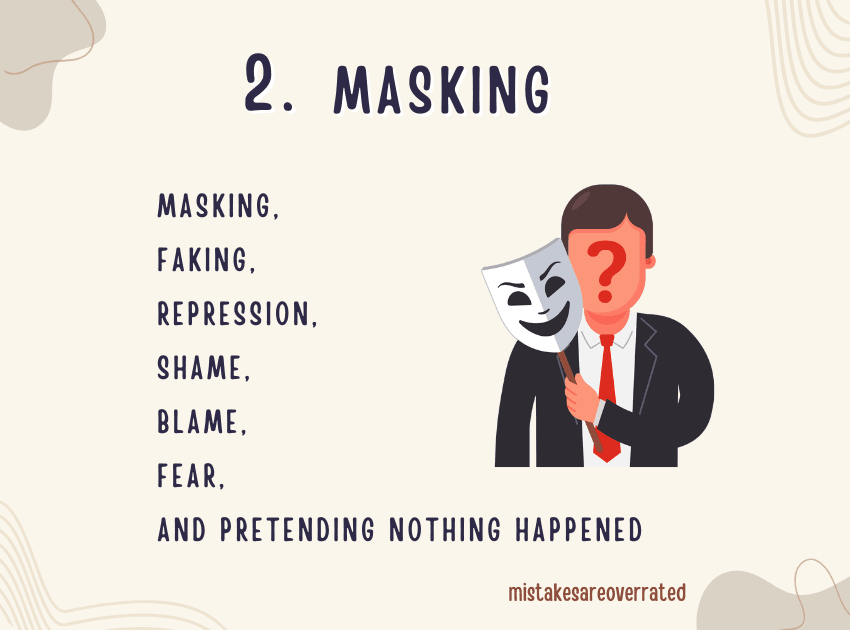
i entered this stage after around 3-4 weeks of my initial response to the trauma,
(remember my response was avoidance and escapism through ‘unhealthy’ mechanisms).
i realised that i didn’t want to carry on staying out late, drinking every weekend to forget what happened – so i turned to faking myself.
*please reach out for professional help if you’re engaging in excessive alcohol consumption.*
this stage involved shame, repression, pretending, faking and masking.
on the exterior for everyone to see i was fine, but within, in the interior i was broken.
i masked that nothing happened and pretended that everything was normal to everyone around me.
due to my first stage being denial, this ‘masking’ stage included repression of my thoughts, emotions and feelings.
suppressing feelings – you are consciously pushing your feelings down and away.
repressing feelings – you are unconsciously pushing your feelings down and away.
this stage lasted 4-5 months.
within this stage:
masking, faking, repression, shame, blame, fear and pretending nothing happened.
strategies to navigate this stage:
identifying the mask
i recommend within this stage becoming aware of the ways you are masking.
you need to acknowledge you’re doing this so you are able to work through this masking behaviour.
please know that this is not a weakness. it is a survival mechanism.
it might involve pushing through stress, saying you’re okay when you’re struggling, distancing yourself from painful feelings, ect.
self compassion
what i wish i used in the early stages of my trauma healing journey is self-compassion.
treat yourself with the same softness and kindness as you would to a close friend who is struggling.
understand that masking is a mechanism we use to cope, especially when it feels unsafe to express our emotions or feelings.
through your inner voice, talking to yourself, gratitude, reminders, writing, acts of care, boundaries, taking a break, affirmations, ect
realisation kicking in
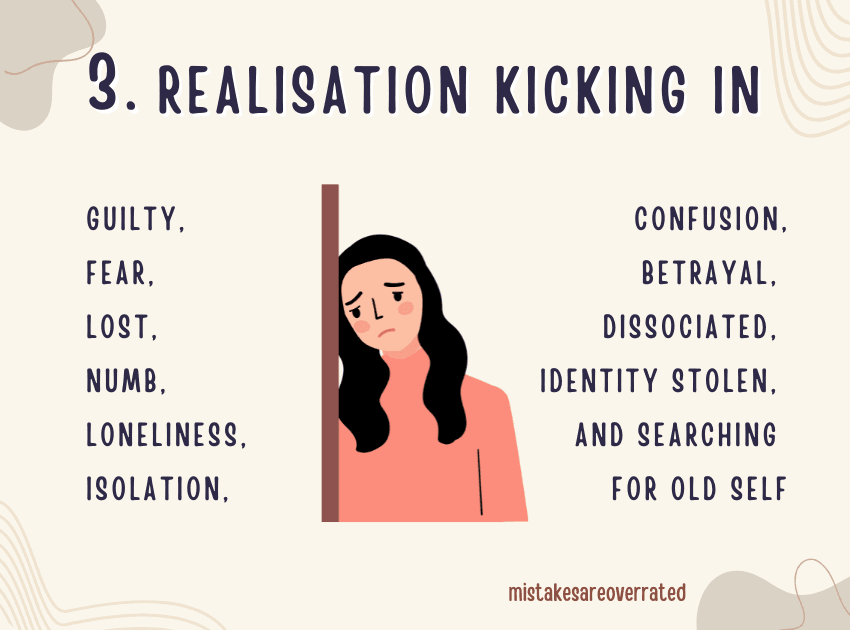
this stage was after i went to the police about my assault.
if i hadn’t of gone to the police and spoke out, i personally don’t think i would of been able to get past the second stage of my healing.
i was absolutely terrified to speak out and i didn’t necessarily even make the decision to do so, it was because circumstances happened.
but reflecting back i am forever grateful i spoke out and reported my assault to the police.
this stage lasted around 3-4 weeks. (during interviews and a couple weeks after i told the police).
speaking out about my assault was the first time i acknowledged what had happened to me.
i suppressed, avoided, escaped and repressed all of my emotions that when i spoke out and acknowledged my trauma, everything hit me.
it felt like i relived the traumatic experience again, as this time i was actually giving myself permission to feel.
allowing myself to feel all the emotions i had suppressed over the last 6 months made me feel lost, numb and lonely.
there were countless times during this stage in my healing where i had to lay down as these emotions were overwhelming and very powerful.
within this stage:
guilty, fear, lost, identity stolen, loneliness, isolation, confusion, betrayal, dissociated, numb and searching for old self.
small moments of authenticity
confide in people you trust and feel comfortable with so you can slowly show your true authentic self.
don’t feel like you have to tell people everything that happened or say everything all at once.
this is your story to tell, so tell people whatever you feel comfortable in sharing.
but having someone (friend, family, therapist, or a support group) be there to support you and your true feelings without any judgment is powerful.
i found that simply just expressing that things weren’t actually fine helped alleviate the pressure weighing on me immensely.
emotional processing

this stage began once i moved from acknowledging what i had been through, to actually understanding when i had gone through.
this stage involved me starting to feel the full weight of the trauma i had been through.
i began to cry more frequently, i felt immense fear, confusion, betrayal and guilt, i had intense flashbacks, triggers and intrusive thoughts.
this made me feel powerless within my body as i couldn’t control my emotions or flashbacks.
this stage lasted 2-3 months – it wasn’t a consistent i felt this way everyday, some days were more intense than others.
within this stage:
pain, grief, exhausted, confused, vulnerable, feel powerless and defeated because not in control of emotions and triggers.
strategies to navigate this stage:
create safe spaces
vulnerability and trust were some of the most difficult aspects to navigate around during my trauma healing journey.
begin by creating small, manageable moments where you can show vulnerability and express your true feelings.
for me i began by showing vulnerability and trust within myself through journaling.
i was able to explore my emotions and trauma without needing to share them with others, but it was powerful when i re-read them.
once i was comfortable within myself, i felt safe enough to talk to others, and even share some of my poems (to who i trusted the most).
an in-depth article on how to trust after trauma is here.
awareness and inner work

after some time of being in the previous stage of feeling emotionally numb and feeling not in control of myself, there was a switch in my brain.
i decided i no longer wanted my trauma to control me nor my life, hence this website’s slogan;
‘don’t give trauma the power to control you, you deserve to live how you want. take control of your trauma.
-life advice from one survivor to another’
i began to dive into research, learning all about trauma, the effects and impacts, how to heal, ways to cope and much more.
this is the stage where i began to cope with my trauma in ‘healthier’ ways.
i turned to journaling – an expressive way to release my emotions and experiences.
i read countless books, read everything i researched, watched videos, listened to podcasts to gain knowledge.
but i didn’t just read and learn – i put the knowledge i learnt into action.
i found strategies and coping mechanisms that worked best for me through trial and error of countless strategies that helped others.
this stage in my trauma healing required time, effort and patience, but the results of this time i put in for myself is how i am in the position i am today.
this stage involved writing my traumatic experience countless times to understand why i have the trauma i do, researching and gaining knowledge on what i had been through and ways i can help myself.
this ‘stage’ is constant in my life, as i am still consistently learning new things about myself and my trauma.
but it lasted around 4-5 months of dedicated time to gain enough knowledge for me to see evidence in my growth.
within this stage:
understanding, expressing, releasing, making sense, research, learning, gaining knowledge and routines.
strategies to navigate this stage:
journaling
journaling helped me dig deep within to un-bury hidden emotions and trauma i had repressed, to identify, acknowledge, process and find strategies to help me.
i have an in-depth article on how journaling can be powerful on your healing journey.
education and knowledge
i recommend during this stage to learn all you can about the type of trauma you have experienced.
this can be through seeing a mental health professional, reading books, research and test studies, survivor stories, ect.
once you have read and learnt the information, make sure you put the knowledge you now have into action in your life.
rebuilding and creating

in my personal journey, this is the stage that took the longest time.
this stage was well over a year for me and it is still current in my life now.
this stage involved grieving my old life, ambitions, relationships and person i was before my traumatic experience.
i did the uncomfortable work of learning all about myself, the good and the bad to rebuild my new self and life i now envision.
i found places i felt safe in so i was comfortable enough to dig deep and become vulnerable with myself to discover hidden values, beliefs and passions i had.
i slowly stepped out of my comfort zone to learn how to trust others again to create connections and regain safety in my life.
within this stage:
rebuilding, understand, gaining trust, grief, creating safety, vulnerability, building self and future, connections, self discovery, learning about body and mind.
strategies to navigate this stage:
this stage, although it’s taken the longest time, it has been incredibly impactful in all aspects in my life.
gratitude
a strategy that helped me switch my focus from my trauma controling me, to taking control of my trauma was through gratitude.
i have an in-depth article on how gratitude can be powerful in trauma healing here.
journaling
again, journaling has helped me profusely with finding the deep aspects of myself that i thought i had lost, or new aspects i had gained.
i have a free downloadable pdf you can print off that includes 10 deep journal prompts for trauma healing, if you need ideas.
self compassion and removed judgement
this was extremely difficult for me when i began to learn about myself and find ways that helped me cope with my trauma.
to feel safe and comfortable within yourself to express yourself openly and honestly, you need to engage in self compassion.
when you hold self compassion, you know that you’re there for yourself and have your back.
there isn’t judgement for how you’re feeling and you support yourself during the hard times.
acceptance and advocacy
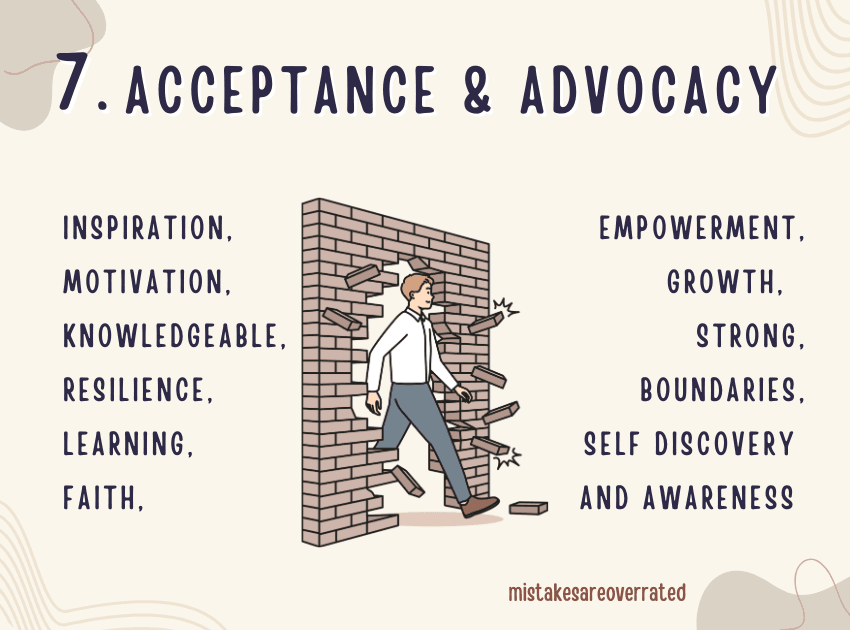
if i read this article when i was at the beginning of my healing journey, or even in stage 3 or 4, i would think this stage was not possible for me to reach.
but look! i reached it – so i believe you can too.
this stage involved me fully accepting what i have been through and the impact it has had on me.
i accept that i am not healed and aspects in my life where i need to do more healing will pop up, but i am ready.
within this stage of my healing, i am no longer afraid to use my voice and speak up about the trauma i have been through – i want to inspire others and let people know that is it possible to heal.
this stage is where i currently am now. i feel like i stepped into this stage 2 and a half years after the assault.
within this stage:
inspiration, motivation, knowledgeable, resilience, faith, empowerment, growth, learning, strong, boundaries, self discovery and awareness.
strategies to navigate this stage:
just because i have reach a position in my life where i am not controlled by my trauma does not mean i have stopped doing my healing work.
it is so important to keep doing what makes you feel connected to yourself, to continue to learn and grow in all aspects of your life.
strategies i continue to do on a weekly basis (if i said daily i’d be lying because i miss a few days here and there due to life being busy)
– journaling – i do expressive journaling, poems, prompts or exercises i feel i need answered
– reading and learning
– mindfulness
– engage in self compassion
– meditation (occasionally, but it’s in my new year resolution to do more)
– i do alot more but i don’t want this list to continue for too long
stepping back to relive
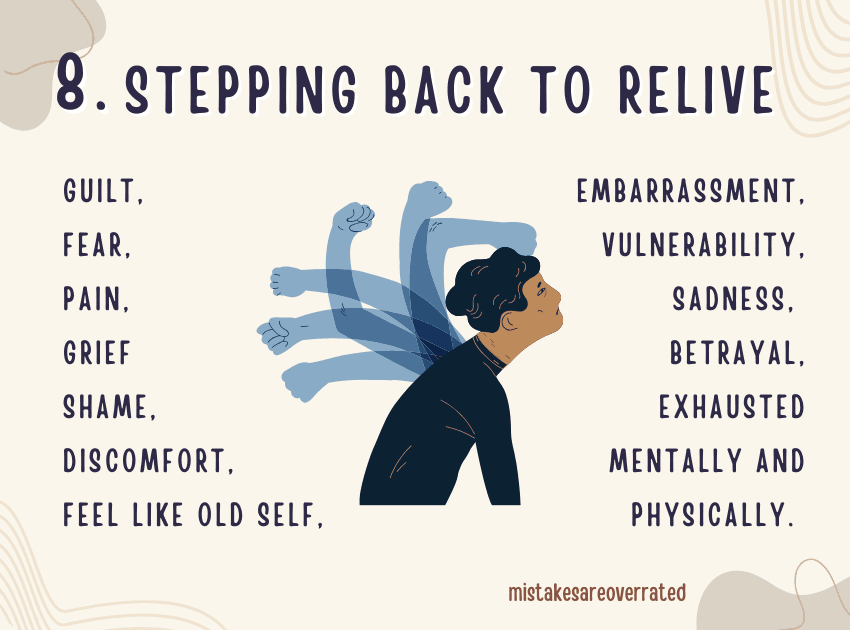
this stage was inbetween the final 2 stages being, rebuilding and creating – acceptance and advocacy.
this was due to the criminal trial starting, over 2 years after i went to the police station.
this stage involved all of my energy – emotionally, mentally, psychologically and physically.
it felt as though all of my work and progress i had done within my journey so far had been stripped away from me and i was back at square one.
i knew this trial was coming up and i had stayed very strong leading up to it, but the reality was, when i walked into the court it all hit me.
being on stand and saying my evidence made me relive my trauma all over again and it really took it out of me.
this stage lasted around 2-3 weeks.
it lasted the week during the trial and the week after the trail finished.
within this stage:
guilt, fear, embarrassment, vulnerability, shame, discomfort, betrayal, pain, grief, sadness, feel like old self, exhausted mentally and physically.
strategies to navigate this stage:
i fell out of a few of my daily habits, but it was necessary to give myself a break as i was using all my effort during the day in the court.
journaling
i journaled on the days i felt it hit me the most – i just wrote down exactly what i was feeling and what i went through that day.
support
i am so blessed and count my lucky stars for the amount of support i had during this trial.
i felt comfortable enough to speak about anything and everything i was feeling to my close friends that came to support me.
i also spoke to my psychologist about everything leading up and after the court trial.
self compassion and positive self talk
this stood out to me immensely during this stage of my healing journey.
when i felt overwhelmed or betrayed before and during court, i would gently and kindly speak to myself.
if i was waiting to be called i would lightly speak to myself to reassure myself i am here and what i am feeling is normal.
if i was on stand, my inner voice would gently speak to me, offering me support and comfort.
mindfulness and affirmations
this helped me profusely when i was going through a flashback during this stage.
i would focus on the things around me, 3 things i can see, 3 things i can hear and 3 things i could feel – this helped bring me back to the present time.
then i would say positive affirmations strong, loud and clear in my head affirming to myself i am here.
i would say “i am strong”. “i will speak my truth”. “i am allowed to cry”
seeking professional help
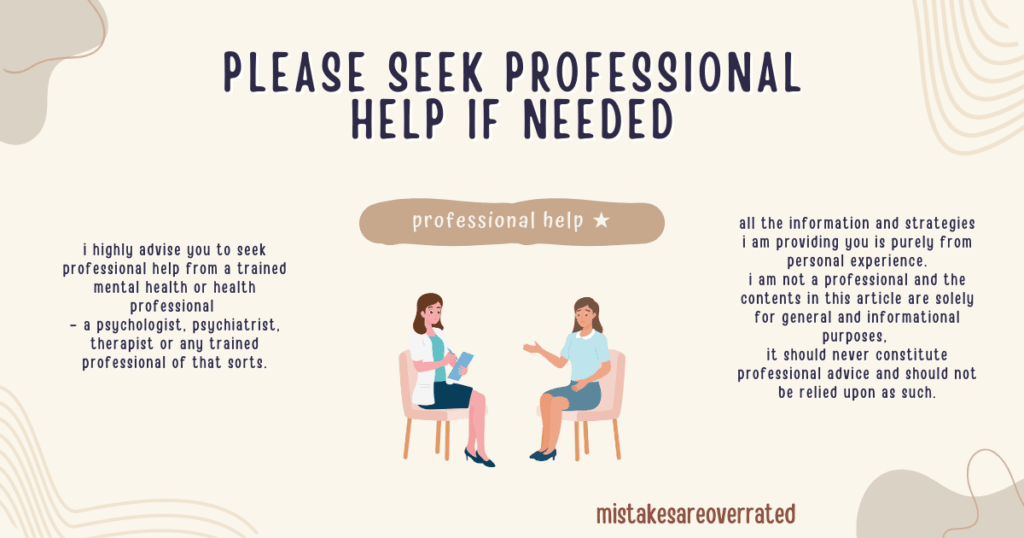
everyone heals at their own pace, and healing from trauma does take time.
i highly advise you to seek professional help from a trained mental health or health professional
– a psychologist, psychiatrist, therapist or any trained professional of that sorts.
all of the information and strategies i am providing you with today is purely from personal experience.
i am not a professional and the contents in this article are solely for general and informational purposes, it should never constitute professional advice and should not be relied upon as such.
contact
i hope my story can let people know that it can get better, even if it feels like it can’t.
begin to put the inner work in and your future self will thank you.
don’t give trauma the power to control you, you deserve to live how you want. take control of your trauma.
-life advice from one survivor to another
you are amazing 🤍
-MAO

Leave a Reply